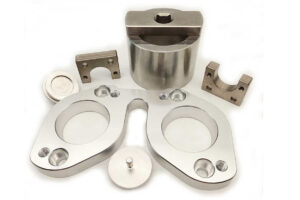We Are a Leading CNC Manufacturing Factory in China
 At our state-of-the-art CNC manufacturing facility in China, we specialize in delivering high-precision machining and fabrication services for a wide range of industries. With advanced equipment, strict quality control, and extensive expertise, we provide cost-effective solutions for custom CNC machining, surface treatment, and injection molding.
At our state-of-the-art CNC manufacturing facility in China, we specialize in delivering high-precision machining and fabrication services for a wide range of industries. With advanced equipment, strict quality control, and extensive expertise, we provide cost-effective solutions for custom CNC machining, surface treatment, and injection molding.
Precision CNC Machining Services
We offer a comprehensive range of CNC machining processes to meet diverse manufacturing needs:
- CNC Milling – High-precision milling for complex geometries
- CNC Turning & Lathe – Precision turning for cylindrical parts
- CNC Drilling – Accurate hole drilling for various applications
- Stamping – High-efficiency metal forming
- 3-Axis & 4-Axis Machining – Multi-directional machining for intricate parts
- 5-Axis Turning-Milling Combined Machining – Ultra-precision machining for complex components
- Injection Molding – High-quality plastic parts production
- Laser Cutting – Clean and precise metal & plastic cutting
Advanced Surface Treatment Options
To enhance durability, aesthetics, and functionality, we provide a variety of surface finishing services:
- Anodized (Aluminum anodizing for corrosion resistance)
- Plating (Zinc, Nickel, Chrome, Titanium, PVD)
- Wire Drawing, Spray Coating, Powder Coating
- Passivation, Electrophoresis, Polishing, Sandblasting
- Knurling, Dispensing, Laser Engraving, Shot Peening
Wide Range of Materials
We work with various metals and plastics to meet different industrial requirements:
- Aluminum: 2000 series, 6000 series, 7075, 5052, etc.
- Stainless Steel: SUS303, SUS304, SS316, SS316L, 17-4PH, etc.
- Steel: 1214L, 1215, 1045, 4140, SCM440, 40CrMo, etc.
- Brass & Copper: C260, C360, H59-H70, Bronze, etc.
- Titanium: Grade F1-F5
- Plastics: POM, Nylon, PC, PMMA, PVC, PU, ABS, PTFE, PEEK, etc.
High-Precision Manufacturing Standards
- Tolerance: ±0.01mm ~ ±0.005mm
- Surface Roughness: Min Ra 0.1~3.2
Industries We Serve
Our precision components are widely used in:
- Optical Instruments
- Smart Stylus & Wearables
- Automotive & Aerospace
- Medical Devices
- Electronics & Digital Communication
- UAV & Robotics
- Pneumatic & Hydraulic Systems
- Audio Equipment & Automation Machinery
Accepted Drawing Formats
We support various design file formats for seamless production:
IGS, STP, X_T, DXF, DWG, Pro/E, PDF, PNG, JPG
Why Choose Us?





Whether you need prototyping or mass production, we are your trusted partner for CNC machining in China. Contact us today for a free quote and expert manufacturing solutions!






